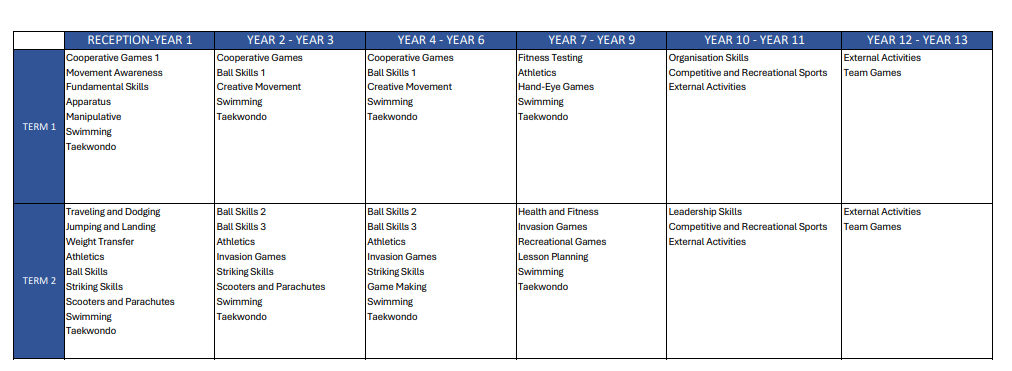PHYSICAL EDUCATION (PE)
Welcome to the Physical Education (PE) curriculum at KIS School, where we prioritise the cultivation of skills, knowledge, and a lifelong commitment to health, fitness, and active living. Our comprehensive programme goes beyond traditional exercise routines, as we believe that PE is an essential component of a well-rounded education.
By engaging in age-appropriate physical activities and understanding the importance of regular exercise, our pupils develop the tools and mindset necessary to maintain an active, healthy lifestyle beyond their school years. Our pupils will acquire the skills necessary to make informed choices about their physical health, allowing them to make conscious decisions regarding exercise, nutrition, and overall well-being.
The benefits of developing these skills and knowledge extend far beyond physical health. Engaging in regular exercise and understanding fitness principles has been shown to positively impact pupils’ lives, both now and in the future. Physical activity enhances cognitive abilities, improves concentration, and boosts academic performance. It also cultivates self-confidence and resilience, empowering pupils to overcome challenges and achieve personal goals in all aspects of life.
Moreover, our curriculum focuses on fostering essential skills in effective communication, teamwork, and problem-solving. Through engaging in team-based games and activities, our pupils will develop these skills as they collaborate with their peers to achieve shared goals.
At KIS School, our PE curriculum aims to set our pupils on a trajectory towards an active, healthy, and fulfilling future. We believe that these skills not only contribute to their physical well-being but also promote cognitive development, enhance academic performance, foster self-confidence, and cultivate mental and emotional resilience. Our commitment to instilling a lifelong appreciation for physical activity equips our pupils with the tools they need to lead vibrant, productive lives, both inside and outside the classroom.
What will pupils learn?
- In this subject, pupils will acquire a wide range of valuable knowledge and skills. It revolves around the notion of learning through movement and using movement as a means of learning. Through age-appropriate physical activities and games, pupils will:
- Enhance their confidence by progressively gaining control, fluency, and versatility in their movements.
- Deepen their understanding of concepts, rules, tactics, strategies, and compositional ideas related to physical activities and sports.
- Engage respectfully and responsibly, ensuring appropriate and safe participation.
- Expand their knowledge and understanding of how physical education contributes to a healthy and active lifestyle.
- Develop transferable skills that foster physical, cognitive, and social growth, enabling them to become independent, critical, and reflective movers and thinkers.
- Moreover, these subjects nurture the development of creative skills, which will prove beneficial in various aspects of pupils’ future learning and personal growth.
How is the subject taught?
This subject is taught through a broad range of learning zones, thought-provoking games and physical activities. It includes cooperative, competitive, athletic, adventurous and health-based contexts that are appropriate for each learning stage. Learners will move for as much of each lesson as possible, with activities designed to promote learners’ confidence, self-esteem, cognitive abilities and social skills. The programme is designed to complement, rather than replace, coaching in individual sports or physical activities.
PE Team:
- Mr Lawrence Haywood (HOD Secondary)
- Mr Jay Sajo (HOD Primary)
- Ms Ivana Zdravkovic (PE Teacher)
- Mr Murphy Sy (PE Teacher)

